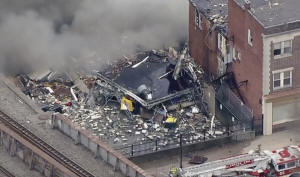Deadly chocolate factory explosion caused by faulty gas fitting, safety
board finds
 Send a link to a friend
Send a link to a friend
 [December 11, 2024]
By MICHAEL RUBINKAM [December 11, 2024]
By MICHAEL RUBINKAM
Cascading failures involving a corroded steam pipe and a defective
natural gas fitting caused a powerful explosion in 2023 at a
Pennsylvania chocolate factory, killing seven workers when the company
failed to evacuate, a federal safety board said Tuesday.
About 70 production workers and 35 office staff at R.M. Palmer Co. were
working in two adjacent buildings at the time of the blast. Employees in
both buildings told federal investigators they could smell gas before
the explosion. Workers at the plant have accused the company of ignoring
warnings of a natural gas leak, saying the plant, in a small town 60
miles (96 kilometers) northwest of Philadelphia, should have been
evacuated.
The National Transportation Safety Board said the factory failed to have
natural gas emergency procedures in place that could have resulted in an
immediate evacuation. The explosion leveled one building and heavily
damaged another, sending flames more than 40 feet (21 meters) into the
air and causing $42 million in property damage.
“Contributing to the accident's severity was R.M. Palmer Company's
insufficient emergency response procedures and training of its
employees, who did not understand the hazard and did not evacuate the
buildings before the explosion,” the National Transportation Safety
Board said in its statement of probable cause, approved Tuesday at the
board's meeting in Washington, D.C.
Palmer has since adopted a revised policy on evacuations, but Jennifer
Homendy, the NTSB board chair, said it’s still insufficient because it
advises staff to investigate and determine if evacuation is necessary.

“That’s exactly what they did in this scenario,” she said. “'No, you
leave.' Now, their response is they have other smells in their building
because chocolate is being made. You know the difference between natural
gas smell and chocolate. ‘Get out, immediately.’ So I think this
actually provides significant confusion for their employees and they
should change it.”
Palmer said in a statement that “not a day goes by that we do not
remember and reflect on the heartbreaking loss of several colleagues and
friends on that tragic day," adding it “takes the health, safety and
wellness of our employees very seriously” and will continue working with
regulators.
The federal safety agency also described the role of UGI Corp., the gas
utility that provided service to the candy factory in West Reading.
An old Palmer steam pipe that was already badly corroded finally
cracked, allowing steam to escape and raising the temperature of UGI's
gas fitting — so much so that it, too, cracked, federal safety
investigators found. Gas then migrated underground and made its way into
the basement of Palmer’s second building, where it exploded.
Investigators couldn’t determine the ignition source.
[to top of second column]
|

In this screen grab from video provided by WPVI-TV/6ABC, smoke rises
from an explosion at the R.M. Palmer Co. plant in West Reading, Pa.,
Friday, March 24, 2023. (WPVI-TV/6ABC via AP)

A UGI crew replacing gas lines in the area in 2021 — two years
before the blast — was alerted to the presence of the steam pipe,
but failed to notify the utility's safety managers so the pipe could
be assessed for its impact on the gas fitting that ultimately
failed, the five-member safety board found.
“By not addressing the threat posed by the steam pipe, UGI
Corporation's distribution integrity management program was not
effective in preventing the accident,” the safety board said in its
findings. The board also said there was a delay in getting gas shut
off after the blast because UGI did not properly mark its valves —
and a critical valve had been paved over.
UGI said it is reviewing the findings.
“Safety remains our main priority in the communities we serve, where
we work, and where we live. UGI continues to work with customers
that also operate underground steam lines, to make sure their
systems and our natural gas systems can operate safely together,”
said John Mason, a company spokesperson. He said the company has
“fully cooperated” with NTSB.
The service tee that failed was made by DuPont and has a known
tendency to crack. The plastic piping is still in widespread use
around the country, but the safety board said many utilities may not
be aware of the locations where it is most vulnerable to failure
from elevated temperatures.
UGI had a chance to remediate the faulty tee during the 2021
pipeline replacement project but did not do so, board investigators
said.
“They knew that this was dangerous, brittle piping for decades. It
should have been remediated,” said Andrew Duffy, an attorney
representing explosion victims in a civil suit. “It's a shocking
failure in an industry whose sole responsibility is to transport gas
through pipelines safely.”
Board member J. Todd Inman compared the Palmer explosion to a 1996
blast at a shoe store in San Juan, Puerto Rico, that killed 33,
saying the NTSB raised many of the same issues then. Federal
regulators have long said that much of the plastic pipe manufactured
for natural gas service from the 1960s through the early 1980s was
susceptible to cracking.
“Sometimes you think we can learn our lesson, or at least the
operators can,” he said.
The NTSB issued a range of recommendations for UGI and other
utilities, regulatory agencies, state governments and R.M Palmer
itself. One recommendation: That businesses, homes, schools and
other buildings served by natural gas install alarms that can detect
a leak.
All contents © copyright 2024 Associated Press. All rights reserved |